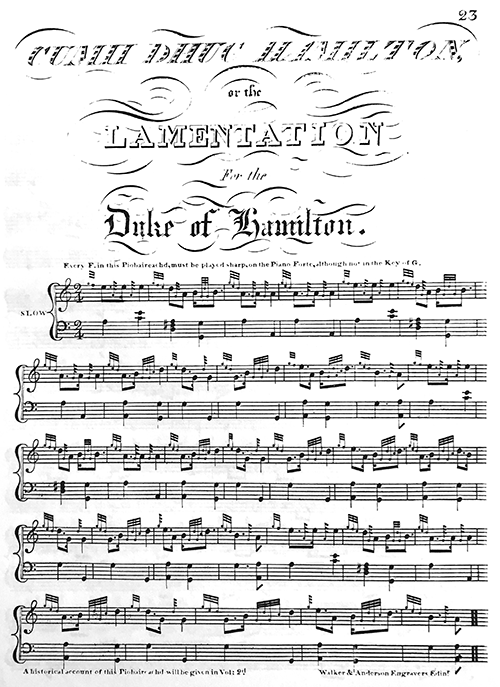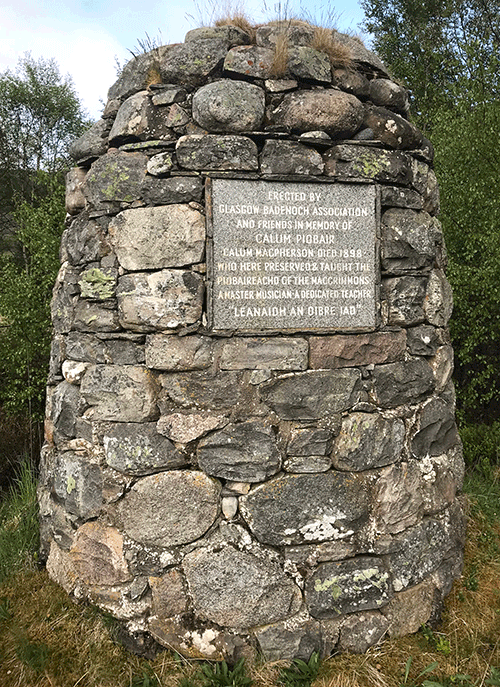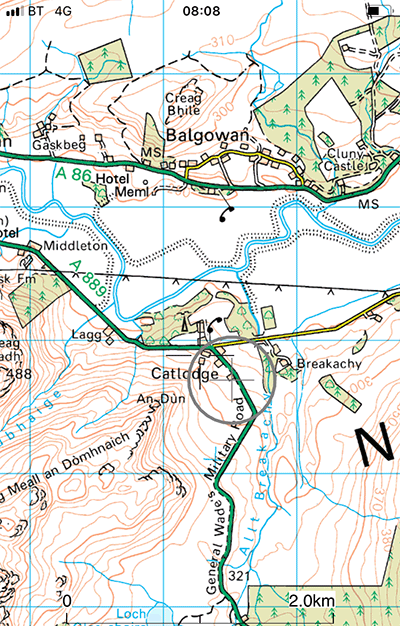Duncan Watson’s comments on the Donald MacDonald Cuach a couple of days ago were pertinent. Why is it that those who play in this contest stick slavishly to the scores as produced by the pioneer of stave writing?
The results are incompatible with traditional teaching, teaching stretching back, at the very least, to the time of Calum ‘Piobair’ Macpherson (1883 -1898), pictured above. We know this from the School of Scottish Studies recordings of his pupil William MacLean. Why did Calum, locked away in his cottage at Cat Lodge in Badenoch, have no knowledge of this Rosetta Stone of piping as some would have us consider MacDonald’s oeuvre? Or if he did, why did he ignore it? Perhaps he could not read music – and that, in another way, proves my point. Here was a man unadulterated in his learning, following a true path learned from his family, the Bruces and through them the MacCrimmons themselves. From William MacLean we know that he played the way we play today. And from the ‘Masters of Piping’ book we learn that Calum played a Donald MacDonald bagpipe – but clearly not a literal interpretation of his music.

I do not believe pipers in the past ever succumbed to any such thing. You only have to listen to it to realise why. The movements do not enhance; they intrude. Try singing a passage strictly as he has written it and you will need no further words from me to be convinced of what I say. It is no wonder that D MacD’s ‘style’ died out – though I question it ever existed.
Donald MacDonald’s book is simply this: an early and valiant attempt at putting an oral tradition on the stave for the benefit of beginner pipers who could read music. There was also a hope that it would encourage ceol mor among mainstream musicians hence his references to flutes and pianos. I quote from MacDonald’s own ‘Preface to his First Edition’: ‘The object of this publication is not to supply a desideratum in our Pipe Music, which has hitherto no written Record, but, at once to facilitate the attempts of Students upon the Great Highland Bag-pipe, and to accommodate its Music to almost all other instruments, such as Organ, Piano-Forte, Violin and Flute….’ Note the word accommodate.
[wds id=”6″]
Sorry to say, but his 1822 book was a flop, just as the recent reproductions have been a flop. You can’t play this stuff off the page with any degree of satisfaction and re-read James Campbell’s monograph on the ‘Elusive Appoggiatura’ in the Piping Times and you will never again play another ‘ting-a-ling’ cadence. As for those double tap echoes with front end emphasis, they might work on the piano but they sure to goodness do not on the chanter.
Pipers and judges taking the Clan Donald shilling in future should re-think their approach and play/expect music as it has come down to us in the oral tradition. Celebrate the settings – not the so-called style – that Donald MacDonald preserved for us, settings well documented in the Piobaireachd Society’s collection by Kilberry and others. Think Too Long in this Condition, John Garve, the improvements he adds to Craigellachie and many, many others. This, and the platform he provided for Angus MacKay, is Donald’s MacDonald estimable legacy, not the off the page interpretations we hear at the Donald MacDonald Cuach. They are as foreign to the modern ear as they would have been to Calum Piobair.
Calming down a bit…….I had occasion to pass the great man’s monument in Badenoch a couple of weeks back and took a snap. Pleasing to see that it is still being well looked after:
The inscription reads: ‘Calum Macpherson died 1898 who here preserved and taught the piobaireachd of the MacCrimmons; a master musician; a dedicated teacher.’ It really is a must visit for all pipers heading north or south on the A9 or other roads. Here’s a map of how to get to it:

Piping Convenor Allan MacColl has passed on details of the super prizemoney on offer at the Lochaber Gathering on August 4th:
P/A Piobaireachd: 1st £300 2nd £200 3rd £150 4th £100
P/A March: 1st £100 2nd £75 3rd £50 4th £25
P/A Strathspey & Reel: 1st £100 2nd £75 3rd £50 4th £25
B/C Piobaireachd: 1st £150 2nd £125 3rd £100 4th £75
B/C MSR: 1st £100 2nd £75 3rd £50 4th £25
OPEN H/J: 1st £60 2nd £50 3rd £40 4th £30
There is also a very handsome gold medal for the March and gold and silver Lochaber axe brooches for the piobaireachd. Enter this contest by clicking on the display ad. Allan has also asked us to point out the change of date to August 4 and that there is a full range of junior contests at Lochaber.
[wds id=”17″]
J David Hester in the US has sent this about James MacColl, the former Shotts-based Gold Medallist (1953, Oban): ‘Alive and well and living with his wife in Laguna Woods, California. I have notified his old students and am assembling his recordings in order to highlight his teaching on Alt Pibroch Club.

‘If you know of anyone who would like to get a hold of him I am happy to share his contact info. And if you know of any recordings, or know of people who may have something of his teaching, please send them my info.’ Email David here.
Born in 1928 James MacColl played in the Shotts band under P/M Tom MacAllister Snr. He had piobaireachd lessons from Iain MacPherson (father of Donald) and Robert Reid. He emigrated to the US in 1955
[wds id=”6″]
















The piano accompaniment reminds me of those Victorian Parlour Song piano accompaniments. Or of the village hall pianists who used to get up and accompany ‘get up and have a go’ singers. I don’t think he was a pianist but had a wee bit of knowledge of what chord sounded ok with notes. I can understand he wanted maybe to encourage other instrumentalists to get involved. And good for him for that. But whether they’re for serious pipers or not, and I don’t know, these aren’t for serious pianists.
Well, Rob – allow me to provide a slightly different take. The beauty and joy of MacDonald style piping is multiform and quite self evident: The fluidity of the crahinins, and the way they can enhance the rhythm of the tune, the way they change rhythmic structure to suit the tune (from echo-beat, to keening style, to dot-cut; in the case of the manuscript for Old Men of the Shells, the crahinins change rhythm over the length of the tune, and are not slavishly repetitive). There is also the emphasis upon tone line, which is no longer lost in and amongst the high-E cadences which not only destroy the rhythmic song structure, but become often as important, if not more so, than the themal notes themselves. Then there are the tempo indicators, which can sometimes be quite surprising, giving us a glimpse into the fact of wide tempo variance between the multiple genres within the class of tunes. Then there are open crunluath fosgailte, far very melody enhance in distinction from the rhythmic flair and of the close MacKay style. In addition, the Da Capo returns that restore the shape of the cyclic structure of the performance.
Absolutely none of these features are played today.
Frankly, Rob – it is the right of the organizers to set the expectations of their invited performance any way they please. If what they want to do is help re-extend the music expression of today’s competition-style pibroch beyond your tradition, they are fully in their rights to do so.
As for whether there was a MacDonald style at all, a cursory glimpse at Peter Reid, MacArthur-MacGregor and the Hannay-MacAuslan collection rather undermines your question of doubt. All of these collections show a far more expansive tradition existed than that which is evidenced in the few surviving trickles of “oral tradition” you mention and draw from.
Finally, the “darwinian” argument seems compelling, until apply its form across human cultural histories: that late market European capitalism and colonialism has succeeded to eradicate thousands cultures, languages, and material traditions does not mean those ones that were lost were inferior or without value. It only means the forces of history overwhelmed them.